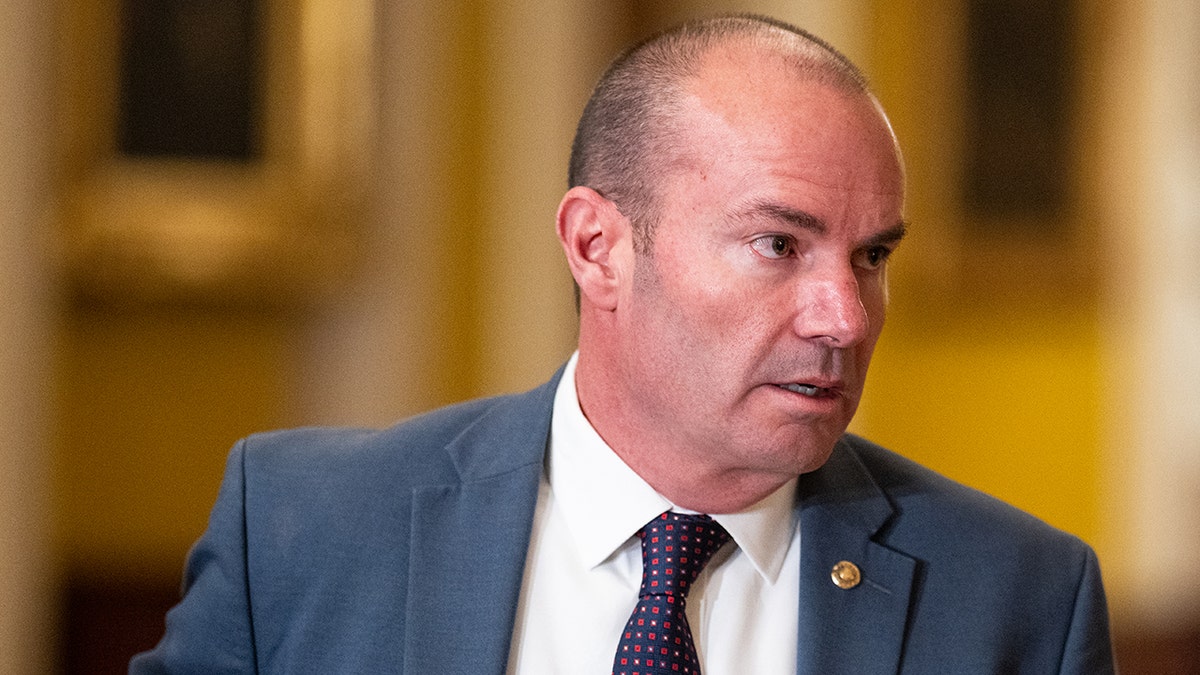INTERNACIONAL
As US-backed group delivers 70 million meals, UN and NGOs fight to discredit Gaza aid rival

NEWYou can now listen to Fox News articles!
The Gaza Humanitarian Foundation (GHF), with support from the U.S. and Israel, has distributed some 70 million meals to Gazans since May. But its aid distribution system has been under consistent attack from Hamas and from some unlikely quarters — the world’s leading aid groups.
Earlier this month, the United Nations Relief and Works Agency (UNRWA) Commissioner-General Philippe Lazzarini called for the «end to the so-called Gaza Humanitarian Foundation (GHF) since it provides nothing but starvation and gunfire to the people of Gaza.» He went on to call it an «abomination.»
His statement noted that 230 NGOs, including Amnesty International, Oxfam International, Norwegian Refugee Council and Save the Children signed their names to an open letter criticizing GHF while urging a return to the U.N.-led aid distribution model.
US-BACKED GAZA AID GROUP LAUNCHES BOLD NEW SYSTEM TO DELIVER FOOD DIRECTLY TO FAMILIES
People carry boxes of relief supplies June 8, 2025, from the Gaza Humanitarian Foundation, a private U.S.-backed aid group, (Eyad Baba/AFP via Getty Images)
Critics say UNRWA’s ties to Hamas have put its very existence at risk, especially given the success of the GHF operation.
Gerald Steinberg, the founder and president of NGO Monitor, told Fox News Digital these groups include «anti-Israel superpowers» with «massive PR budgets and dedicated staffs and are able to promote their attacks on GHF widely.»
Steinberg claimed that GHF has already demonstrated «that aid to Gaza can be provided without relying on the old corrupt billion-dollar aid industry led by U.N. agencies like UNRWA and the NGOs that are allied with Hamas.»
Steinberg said the number of signatories to the letter has grown to more than 230 as the «powerful NGO network is fighting back and making false accusations in an all-out political effort to force Israel and other donors to end the GHF operation.»

Photos released by the Israeli Defense Forces show three individuals the Israeli military claims are Hamas terrorists inside an UNRWA compound in Rafah. (IDF)
AMERICAN VETERANS ATTACKED, INJURED WHILE DISTRIBUTING AID IN GAZA WITH US-BACKED GROUP
GHF interim Executive Director John Acree said he has no enmity for the NGO signatories of the letter.
«They write papers and letters and sign documents, and yet we’re doing it,» Acree said. He implored the groups to «please, come. Come and help us.»
Acree says GHF reached out to other aid groups «daily» to ask for support. In some cases, humanitarian workers have entered discussions that «we’re hoping will eventually lead to partnerships and implementation.»

Gazans go to and from an aid collection spot. (Amit Segal)
Since May, GHF has faced numerous criticisms about its operations, including accusations that Gazans have been killed and injured at distribution sites.
In response to Fox News Digital’s questions about Lazzarini’s remarks, an UNRWA spokesperson emphasized that «UNRWA, like the rest of the U.N., has repeatedly condemned the current aid distribution system in Gaza,» which it says «is costing more lives than it saves.»
UNRWA alleged that «800 starving people have been reported killed since this scheme started operating on the 28th of May,» adding that «instead of ‘orderly food distribution,’ this system brings dehumanization, chaos and death.»
Lazzarini once again went on X to condemn the U.S.-backed aid mechanism, claiming that «a functioning system was replaced with a deadly scam to force the displacement of people+ deepen the collective punishment of the Palestinians in Gaza.»

Palestinians storm trucks loaded with humanitarian aid brought in through a U.S.-built pier in the central Gaza Strip May 18. (AP/Abdel Kareem Hana)
AMERICAN VICTIMS OF TERRORISM COULD SOON SUE INTERNATIONAL ORGS IF CRUZ’S BILL PASSES
GHF released a statement Friday as the war of words continued.
«These false and misleading stats come directly from the Hamas-controlled Gaza Health Ministry,» the statement said. «The U.N.’s reliance and coordination with a terrorist organization to falsely smear our effort is not only disturbing but should be investigated by the international community.»
Hamas has responded violently to GHF’s arrival on the aid scene. Acree said that GHF’s operation «is going against [Hamas’] system of stealing foreign aid, of controlling the market prices, of basically robbing the Palestinians that live in Gaza of their livelihoods and their economic welfare, and we’re breaking that.»
So far, 12 Palestinian GHF staff members have been killed and possibly submitted to «summary execution» on June 11. On July 5, two «highly decorated» U.S. veterans working with GHF were harmed in a grenade attack at a GHF distribution site.

Hamas terrorists stand in formation as Palestinians gather on a street to watch the handover of three Israeli hostages to a Red Cross team in Deir el-Balah, central Gaza, Feb. 8, 2025. (Majdi Fathi/NurPhoto via Getty Images)
Acree said that GHF is evolving. The organization «did not expect the desperation» it encountered.
«We’ve been told by the Gazans this is the first time they’ve ever received free aid or food, and they’ve had to pay for it up til now,» he said. To counter that desperation, Acree said that GHF is «taking measures now to help tap that tension and to help them understand that we’re there to help and relieve that hunger.»
He said the group still needs «more aid. We still need a lot more help,» which includes partnerships with the U.N. and NGOs.
CLICK HERE TO GET THE FOX NEWS APP
The U.S. Agency for Infrastructure and Development has given $30 million to the GHF. Two sources who spoke to Reuters said the U.S. may approve $30 million per month in grants to the GHF in the future.
INTERNACIONAL
Violent attack reignites BOWSER Act debate as Trump floats federal takeover of DC

NEWYou can now listen to Fox News articles!
A Senate Republican renewed his push to federalize Washington, D.C., following an attack on a former Department of Government Efficiency (DOGE) staffer and President Donald Trump’s threat to put the District under federal control.
Sen. Mike Lee, R-Utah, has long called for control of Washington to fall under Congress, going so far as to introduce the Bringing Oversight to Washington and Safety to Every Resident (BOWSER) Act, named after D.C. Mayor Muriel Bowser, in an effort to combat crime in the District.
REPUBLICAN BILL WOULD PUT ‘ANARCHIST JURISDICTIONS’ ON NOTICE, THREATEN FEDERAL FUNDING
President Donald Trump speaks to the media as he arrives at Glasgow Prestwick Airport on July 25, 2025, in Prestwick, Scotland. (Andrew Harnik/Getty Images)
The bill, which Lee introduced alongside Rep. Andy Ogles, R-Tenn., has not made it out of committee since being dropped in February. But Trump’s highlight of an attack against former DOGE staffer Edward Coristine, also known as «Big Balls,» has resurrected the discussion.
«The Constitution already federalizes D.C.,» Lee said on X. «We just need Congress to do its job — and reassert its lawmaking power over our nation’s capital city. My bill, the BOWSER Act, would do that.»
Fox News Digital reached out to Lee for further comment.
SENATE REPUBLICANS LAUNCH CRACKDOWN ON DC PERMITTING ILLEGAL IMMIGRANTS, NONCITIZENS TO VOTE IN ELECTIONS

Sen. Mike Lee, R-Utah., arrives for the Senate Republicans leadership election in the Capitol on Nov. 13, 2024. (Bill Clark/CQ-Roll Call, Inc via Getty Images)
Lee’s bill would effectively repeal the District of Columbia Home Rule Act, a law passed in the 1970s that established a city council and mayor and reduced the amount of oversight that Congress has over the city and its affairs.
But calls have grown by lawmakers over the years to increase Congress’ oversight of the city, largely centered on concerns over increased crime and criticisms of attempts to rewrite the District’s criminal code.
And Trump jumped into the discourse, too, threatening that if «D.C. doesn’t get its act together, and quickly, we will have no choice but to take Federal control of the City.»
«Perhaps it should have been done a long time ago, then this incredible young man, and so many others, would not have had to go through the horrors of Violent Crime,» Trump said on his social media platform, Truth Social. «If this continues, I am going to exert my powers, and FEDERALIZE this City.»
Fox News reached out to Bowser’s office for comment but did not immediately hear back.
‘SHOULD HAVE BEEN PREPARED’: GOP SENATORS FIGHT FOR UNIFIED MESSAGE ON TRUMP’S ‘BIG, BEAUTIFUL BILL’

DC Mayor Muriel Bowser speaks at a news conference on Capitol Hill in Washington on March 10, 2025. (AP Photo/Ben Curtis)
Zack Smith, a senior legal fellow at The Heritage Foundation and a former prosecutor, told Fox News Digital that in the past, the D.C. council has pushed «policies that have made it much more difficult for law enforcement, for prosecutors, to do their jobs and keep citizens safe.»
Bowser and the D.C. Council have, for several years, worked to update the District’s criminal code. However, changes to the code that would have severely lowered sentencing for a variety of crimes that were at first vetoed by Bowser were on the precipice of becoming law before Congress and former President Joe Biden overrode the reforms.
CLICK HERE TO GET THE FOX NEWS APP
Smith noted that Congress still has the authority to legislate the District, meaning that lawmakers and the federal government are «still the backstop,» and that both Trump and Lee were right to call for a «reevaluation of the District’s status.»
«That’s why Congress was able to step in and overturn that proposed radical rewrite of the Criminal Code,» he said. «And so what the BOWSER Act would actually do, if it repeals home rule, it would essentially change the way the local D.C. government functions. It might involve Congress and the Federal Government taking a more direct role.»
«I think there is broad and in some ways bipartisan consensus that the current system in D.C. is not working as it should,» he continued.
politics,doge,donald trump
INTERNACIONAL
Vicente Palermo y el desafío existencial de sus nuevos relatos

El matadero municipal se extendía en un inmenso rectángulo a las afueras de la diminuta ciudad. Sus muros le eran familiares porque acostumbraba aproximarse a ellos en sus caminatas diarias. Fue a la sombra de los mismos que Auguste Menard tomó ese día su decisión: dejaría de ser un contemporáneo. Radicalmente enfadado con el presente, el futuro le atraía todavía menos, en su estólida previsibilidad. No le quedaba, entonces, sino sumergirse en el pasado. No se trataba de viajar por el tiempo, odiaba la ciencia ficción. Dejar de ser un contemporáneo consistiría en construir las condiciones de su vida en un pasado o, en otras palabras, en forjarse un nuevo presente.
Una dura tarea. Debía lograr la proeza de que su mente se tornara plenamente contemporánea al pasado elegido, para que este se constituyera en su nuevo presente. Debería empezar forzosamente por decidir el punto en el sistema de coordenadas espacio-tiempo. Lazos de familia habían hecho que él dominara con soltura la lengua francesa; fundadas razones lo llevaron a escoger los años inmediatamente posteriores a la Comuna de París como su nuevo presente (cuando el levantamiento aplastado no era, todavía, un compendio de ingenuidades sino la raíz del futuro). De esa manera, Menard zafaba también de uno de los principales escollos percibidos: recrear las percepciones pictóricas europeas anteriores a Francisco de Goya estaba más allá de sus capacidades. Además, eso le permitiría disfrutar de los excelentes vinos españoles, del rioja sobre todo, como el Marques de Riscal, descubiertos en la Exposición de París de 1871 (sí, siempre había llamado su atención esa fecha, su proximidad con Thiers y los comuneros).
Pero no lo haría en el escenario de la Comuna sino en las ricas tierras viñateras de Bordeaux, lejos también de esta ciudad, más cerca de Pau, donde su padre, un austríaco que había consagrado su vida a los negocios, había edificado el inmenso solar en el que siempre había vivido.

De sus contados amigos se despidió diciéndoles que, puesto que habría de olvidarlos, no los extrañaría. Perplejos, se resistieron vacilantes al adiós.
Precisaba una mucama capaz de fungir como su único contacto con el mundo exterior. Examinó varias candidatas, pero las descartó porque todas hablaban con el fuerte acento meridional que había terminado de contaminar la región apenas 50 años atrás, obra de silenciosas migraciones internas. Cuando se presentó una muda, que además parecía en extremo despierta, Menard no dudó en contratarla.
Eliminó todos los vestigios de modernidad aún presentes en el interior de su casa. Reemplazó viejas fotografías por daguerrotipos, pistolas vetustas por trabucos arcaicos, un Pissarro de 1891 por una panoplia, y el acostumbrado artefacto en que se sentaba diariamente por una letrina. Un nuevo tipo de salero diseñado a principios del siglo XX, y que mucho apreciaba, conoció la misma suerte ingrata que la radio a galena. Se desprendió de su guarda ropas, por entero, y lo reemplazó por un puñado de indumentarias antiguas que la diligente criada silenciosa supo conseguir. Una vez hecho todo esto y mucho más, advirtió lo que ya sabía de antemano: había cumplido con una porción ínfima de su trabajo. Aquello que ahora le esperaba era lo más arduo: procesos mentales cuya complejidad intuía pero que nunca había recorrido.
Supo desde el comienzo que habría de resignarse a una fuerte incoherencia, porque ¿cómo construir las condiciones de su nuevo presente subjetivo sin apelar a materiales de su presente biológico, el único que había adquirido al nacer? A menos que su inmersión en el pasado significara un drástico embrutecimiento, cosa a la que no estaba dispuesto a resignarse, habría de hacer transacciones. Si quería, digamos, leer cotidianamente las ediciones de Le Figaro desde 1871, precisaría valerse de medios técnicos inexistentes en esa fecha. Si deseaba mantener a raya las enfermedades que asediaban su precaria salud física, debía contar con medicamentos que se crearían sólo bastante después de los tiempos de la guerra franco prusiana. Menard salió al cruce de esta fuerte impugnación diciéndose a sí mismo que, al fin y al cabo, los seres humanos se movían en una incoherencia semejante ya que vivían permanentemente, aunque por lo general sin saberlo, en el pasado y el presente al mismo tiempo. Lo que más le dolió fue quemar una parte sustancial de su biblioteca, que quedó reducida a unas decenas de libros, malamente incrementadas por unos cuántos más que pudo adquirir a intrigados libreros. Incineró inclusive ediciones recientes de autores antiguos, en la esperanza de hacer más rigurosa su recomposición mental.

Pero le faltaba sortear un nuevo obstáculo; sabía él que, quien vive en el presente, tiene por delante un futuro abierto, y su voluntad puede incidir en el curso de los acontecimientos. Esto no sucede con quien vive en el pasado, ya que sus futuros en verdad no lo son, ya están determinados, por definición no dispone de opciones a su arbitrio. ¿Se trataría, el suyo, entonces, de un vivir en un pseudo presente, un presente ajeno a la condición humana? A esta poderosa refutación de su emprendimiento, Menard se respondió que esa libertad está a disposición de apenas una por millón, quizás por cien millones, de personas, los hombres extraordinarios, y él no pretendía para sí sino el pasado y el futuro de un hombre común, ya que no se sentía otra cosa. No pretendía tener la menor influencia sobre los hechos futuros en circunstancia alguna, ni traspasar el límite de una sabiduría moral estrictamente contemplativa. Su objeción, por tanto, estaba salvada.
Con todo, la muralla más formidable que se interponía entre Menard y su nuevo presente, era otra: la persistencia soberana del recuerdo. Que los hombres sabían olvidar era una constatación más bien deprimente en todo tiempo y lugar, pero él no precisaba de esa forma de olvido, sino de una mucho más radical. No precisaba borrar la memoria de los hechos, precisaba apagar los propios hechos. No necesitaba eliminar el recuerdo de las atrocidades de la batalla de Solferino, sino a la batalla misma.
Pero el aprendizaje del olvido no habría de consistir meramente en un ejercicio lineal, destinado a devorar una larga sucesión de hechos, sino también en un apagar de las huellas que los acontecimientos habían impreso en la percepción y el significado de acontecimientos anteriores. Era para Menard inaceptable sentar sus reales en 1871 y mantener una lectura de la Revolucion Francesa influida por las grandes contribuciones historiográficas desde fines del siglo XIX. O juzgar los primeros pasos del colonialismo europeo en África a la luz de la confrontación interinperialista de la Gran Guerra.

Recorrer ese camino resultó, sin embargo, menos penoso de lo que había sospechado. A medida en que más se enfrascaba en su nuevo mundo más eficientemente funcionaba el aparato cognitivo que destruía secuencias enteras de acontecimientos y las reemplazaba por otras; poco a poco, el olvido como fatigoso ejercicio volitivo fue dando paso a una práctica más impensada, que al cabo descansó completamente en esferas no conscientes de su campo mental. Cuando esto ocurrió, y el avance del olvido se tornó incontenible, ya no percibia, naturalmente, lo lejos que había llegado. Se había olvidado de olvidar, puesto que su mente olvidaba sola, y todo lo que había olvidado descansaba, más bien yacía en estratos abisales de su cerebro, desde los que no podía emitir ni siquiera la señal del esfuerzo atroz realizado para hundirlo en ellos. Jugó a su favor, en lo que se refiere a su vida personal, que ésta, sostenida en una sólida fortuna familiar, estaba casi completamente desprovista de episodios que pudieran tener algún interés ni para él mismo; personalmente no tenia nada que olvidar, en otras palabras.
Cuando su nuevo presente entró en régimen, no persistían en el talud su mente ni los vestigios de su mundo anterior y, blindado por un aislamiento sin fisuras, disfrutó algunos años de paz. Decididamente encontraba ese presente más confortable, aunque, víctima de su propio éxito, Menard ya no podía compararlo con ningún otro. Esa precaria felicidad no podía durar por siempre, porque se edificaba en base a una paradoja: la reducción de su vida privada a una reclusión absoluta amplificaba el impacto de las noticias del mundo exterior del pasado-presente, que le llegaban por medio de los periódicos de época y algunas otras fuentes que su perspicaz servidora supo conseguir, o inventar.
Un día se descubrió a sí mismo vomitando; tras Cuba y Filipinas, se le antojaba incontenible el ascenso de los Estados Unidos en el concierto internacional y con ello inexorable la extinción del mundo del espíritu en el que había creído vivir. Fue un punto de inflexión; la atmósfera decadente de la Belle Epoque, y la creciente degradación de la familia imperial rusa – en la que Menard había cifrado confusas esperanzas –, completaron un cuadro que se llenaba cada vez más de hechos abrumadores. Lo invadió una repugnancia que lo deprimió profundamente. Estuvo meses envuelto en un recóndito desasosiego, arrojado a un laberinto del que, finalmente, encontró la salida saltando sus paredes.
Se daba cuenta de que jamás en su vida había tomado una decisión tan importante. Ésta lo impulsaba hacia un mundo desconocido, y para llegar a él, habría de internarse por senderos nunca pisados. Dejaría de ser un contemporáneo.
INTERNACIONAL
Una mirada al interior de la guarida de Jeffrey Epstein en Manhattan

Mansión
Registros

 CHIMENTOS1 día ago
CHIMENTOS1 día agoMalas noticias para Wanda Nara: por qué la bajaron misteriosamente de MasterChef: «No va a salir este año»

 DEPORTE1 día ago
DEPORTE1 día agoEl Como de Fàbregas, el nuevo rico de Italia

 POLITICA1 día ago
POLITICA1 día agoSebastián Pareja justificó el armado de listas de LLA en la Provincia: “El desafío era dar una opción diferencial”


























